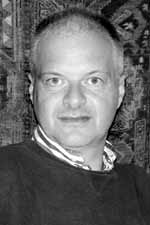|
Wednesday, April 28, 2000 http://www.cjnews.com/main.htm
Editorial
picture: Robert Jan Van Pelt Irving's cross-examination said 'surreal' By FRANCES KRAFT Staff Reporter
Although Lipstadt and her team celebrated their victory, "there was a real sense that this was a completely obscene issue we'd been involved in," said Robert Jan Van Pelt in an interview at his home last week, following his return to Canada. "When you're a Jew - and I am a Jew - there's something disconcerting in someone denying your own history and the history of your people." A native of Holland born to a Jewish mother and non-Jewish father, Van Pelt was named for an uncle who was killed in Auschwitz. He is a cultural historian (not an architect) and co-author with Deborah Dwork of the 1996 book Auschwitz, 1270 to the Present. He wrote an even weightier tome on Auschwitz - a 772-page report, along with two supplementary reports - as evidence for the trial. The issue of Auschwitz became the central point of contention at the trial, Van Pelt told The CJN. "Irving was prepared to admit large-scale killings on the east front - these could be explained as killings done in the heat of war - but when you come to extermination camps like Auschwitz, you cannot explain this as part and parcel of the violence of a normal war situation." In his cross-examination of Van Pelt, Irving -- who served as his own lawyer -- insisted that gas chambers at Auschwitz had no roof vents and thus could not have been used to kill inmates. Van Pelt countered that argument, and similar ones, saying that evidence and testimony in the years since World War II made it a "moral certainty" that gas chambers were the main instruments of murder at Auschwitz between the summer of 1942 and fall of 1944. His report explains at some length the difference between "moral certainty" and other types of certainty. Moral certainty is based on quality of evidence and is the best certainty a historian can have, he said. "It's a very particular technical term." As the first expert witness to be called, Van Pelt was cross-examined for a total of almost four days by Irving. Unexpectedly, Van Pelt was compelled to declare his religion when the judge wrongly assumed the Bible on which Van Pelt would take his oath was a Dutch Protestant version. In fact, he used a German-Jewish prayerbook that has been in his family since the 1930s. He was nervous, he admitted. Although Irving attempted to undermine his credibility by exposing him as a non-architect, Van Pelt realized after the first half dozen hours "he wasn't going to damage me, really." In fact, one of Lipstadt's lawyers, Richard Rampton came to the same conclusion and on Jan. 26 (the second day of Van Pelt's cross-examination) penned an outline of a sinking S.S. Irving alongside a victorious HMS Van Pelt, which he later presented to Van Pelt. The experience of being cross-examined by Irving was like
a cat-and-mouse game, Van Pelt said. Irving's "traps, most
of the time, don't appear to be much of a trap... You have
this incredible tension... It becomes a kind of surreal
situation." Related items on this website: Reader A S Marques writes about Van Pelt on the "moral certainty" | Van Pelt (fee: £109,000) used the term in his Report [download as pdf] | Mr Irving mocked this in his closing statement on March 15 (Day 32) | Write to Van Pelt |
April 28, 2000 | |
| |


 TORONTO
- The verdict in the recent London trial
that pitted American historian Deborah Lipstadt
against plaintiff David Irving, the British Holocaust
denier, was "quite a bitter victory," according to the
44-year-old University of Waterloo
professor of
architecture who served as an
expert witness in the case.
TORONTO
- The verdict in the recent London trial
that pitted American historian Deborah Lipstadt
against plaintiff David Irving, the British Holocaust
denier, was "quite a bitter victory," according to the
44-year-old University of Waterloo
professor of
architecture who served as an
expert witness in the case. Website
fact: The news item does
not mention that this website has a complete transcript of
Van Pelt's testimony ; or that it has a free download of Van
Pelt's opus; or that the defence team floated on a six
million dollar slush fund provided by Stephen Spielberg,
Edgar J Bronfman, and the American Jewish Committee, which
enabled them to pay 21 lawyers and "experts"; This "not
really an architect" Van Pelt (remember the fuss when it
turned out that Fred Leuchter was "not really" an engineer)
received £109,000 (nearly $300,000 Canadian) to testify
as he did. Mr Irving did not pay his defence witnesses one
cent or sous: they testified from conviction, not for
reward. [
Website
fact: The news item does
not mention that this website has a complete transcript of
Van Pelt's testimony ; or that it has a free download of Van
Pelt's opus; or that the defence team floated on a six
million dollar slush fund provided by Stephen Spielberg,
Edgar J Bronfman, and the American Jewish Committee, which
enabled them to pay 21 lawyers and "experts"; This "not
really an architect" Van Pelt (remember the fuss when it
turned out that Fred Leuchter was "not really" an engineer)
received £109,000 (nearly $300,000 Canadian) to testify
as he did. Mr Irving did not pay his defence witnesses one
cent or sous: they testified from conviction, not for
reward. [